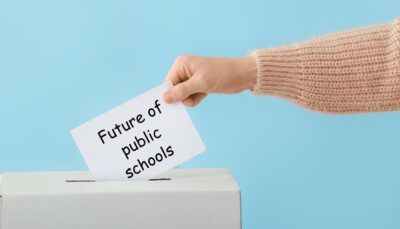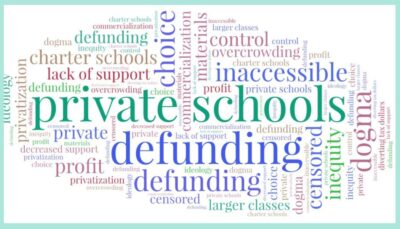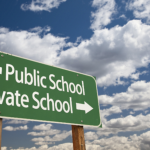IPE/BC is an independent, non-partisan organization, however we recognize that IPE/BC Fellows and guest authors hold a range of views and interests relative to public schools, education issues, and the political landscape in BC. Perspectives is an opportunity for Fellows and others to share their ideas in short, accessible essays.
The Impact of the New Rights on the Privatization of Education
Andrée Gacoin
November 25, 2024
The conservative discourses of the new Rights, and their impact on education, was top of mind in October 2024 as BC went to the polls to elect a new provincial government. In Canada, education is the mandate of provincial governments and, while education is not always an  election issue, this particular race was dominated by harmful and hateful rhetoric that sought to control and further privatize education. This included:
election issue, this particular race was dominated by harmful and hateful rhetoric that sought to control and further privatize education. This included:
-Censoring of classroom materials. In media interviews, as well as the party platform, the Conservative Party of BC critiqued educational materials for being politically biased and promoting (progressive) ideologies.[i] The popularity of this view can be seen in the increase of “book challenges” across Canada. These challenges are when individuals or group seek to remove books from school libraries or restrict them to certain audiences. Books that are inclusive of diverse gender identities and sexual orientations, as well as books by Indigenous, Black and authors who identify as People of Colour have all been challenged.[ii]
-Attacking social justice and rights-based approaches as “indoctrination” and seeking to control teachers’ professional autonomy. The Conservative Party’s agenda built on moral panics that have mobilized parent groups across the province, panics seen in previous elections for school trustees as well.[iii] For example, groups have gathered outside schools, and targeted individual teachers, to protest the inclusion of sexual orientation and gender identity in the curriculum.[iv] Complaints have been made to the Teacher Regulation Branch, a body that governs the professional conduct of teachers, related to teacher’s curricular decisions related to social justice issues.
-Being explicitly anti-union. The Conservative platform focused on terms such as “open procurement” and “qualified” workers and critiqued government for being overly influenced by unions. This is part of a broader fiscal conservatism that promotes reduced government spending, free markets, free trade, and privatization.
–Increased funding for private schools. In BC, many private schools (called “Independent Schools”) receive government funding at either 50% or 35% of their local public school district rate. The Conversative Party of BC argues that private options are necessary because of parent’s concerns about the “ideologies” being taught in public schools.
While the Conservative Party of BC did not ultimately win (barely),[v] they have formed the official opposition and there was overwhelming support for the Conservatives in many parts of the province. Their ideas for education are reflected in the ongoing advocacy of right-wing Think Tanks, such as the Fraser Institute, that champion education reforms “to achieve better value for money and improved results for both students and taxpayers.”[vi] Proposed measures include returning to a “back-to-the-basics” curriculum, increasing student testing for accountability, and establishing charter schools in the province.
support for the Conservatives in many parts of the province. Their ideas for education are reflected in the ongoing advocacy of right-wing Think Tanks, such as the Fraser Institute, that champion education reforms “to achieve better value for money and improved results for both students and taxpayers.”[vi] Proposed measures include returning to a “back-to-the-basics” curriculum, increasing student testing for accountability, and establishing charter schools in the province.
The political landscape in BC reflects the rise of conservative politics across Canada. In the province of Ontario, for instance, there is a populist provincial leader who has consistently underfunded public education for six years, leading to larger class sizes, decaying buildings, and fewer supports and services for students.[vii] In Quebec, the rise of conservatism can be seen in politicians who openly and proudly push an anti-union agenda and attempt to convince the public that unions are to blame for the failing of public services. This is coupled with xenophobic rhetoric that blames immigrant populations for problems within the province.[viii] Nationally, the leader of the Conservative Party is seeking to be the next Prime Minister of Canada. He is a self-described “champion of a free market,” believes in “limiting government” and posits that schools should “stick to teaching math, reading and writing.”[ix] Public opinion polls indicate that he would win if the Canadian election was held today.[x]
 As illustrated in the case of the BC election, these conservative political parties are linked to the rise of the “parental rights” movement in Canada – a movement that embodies the many links between far-right ideologies and interest in education privatization. In BC, for example, the attacks have been focused on a program called SOGI 123, which supports teachers to make schools safer and more inclusive for students of all sexual orientations and gender identities. Contrary to the arguments of the new Rights, research illustrates the positive impact of this program. A recent evaluation of SOGI 123, done by researchers at the University of British Columbia, found that the program decreased bullying and sexual orientation discrimination for both LGBT+ and also for heterosexual students.[xi] However, conservative groups, taking up the language of “choice” in education, continue to attack the program (and those who teach it) as “indoctrinating” kids and promoting “radical ideologies.”
As illustrated in the case of the BC election, these conservative political parties are linked to the rise of the “parental rights” movement in Canada – a movement that embodies the many links between far-right ideologies and interest in education privatization. In BC, for example, the attacks have been focused on a program called SOGI 123, which supports teachers to make schools safer and more inclusive for students of all sexual orientations and gender identities. Contrary to the arguments of the new Rights, research illustrates the positive impact of this program. A recent evaluation of SOGI 123, done by researchers at the University of British Columbia, found that the program decreased bullying and sexual orientation discrimination for both LGBT+ and also for heterosexual students.[xi] However, conservative groups, taking up the language of “choice” in education, continue to attack the program (and those who teach it) as “indoctrinating” kids and promoting “radical ideologies.”
Across Canada, this “moral panic” becomes a weapon against public education in two key ways. Firstly, it is used as a political rallying call to “take-back” public education, such as by electing morally conservative trustees on public school boards. Secondly, it legitimizes parent “choice” to opt-out of public education and mobilizes this “choice” to increase the privatization of public services.
[i] See for example: https://www.cbc.ca/news/canada/british-columbia/bc-conservatives-election-eductation-policy-1.7351918 and https://www.cbc.ca/news/canada/british-columbia/sogi-123-sexual-education-b-c-election-2024-1.7333988
[ii] https://www.teachermag.ca/post/book-challenges-protecting-diversity-in-our-llcs
[iii] See for example: https://www.comoxvalleyrecord.com/community/courtenay-school-board-trustee-candidate-distributing-anti-sogi-material-1636411
[iv] See for example news coverage, and teachers’ responses, at: https://pressprogress.ca/surrey-teachers-speak-out-against-misinformation-around-2slgbtq-education-in-bc-schools/
[v] 47 seats in the BC Legislative Assembly are needed to form a majority government. The center-left National Democratic Party (NDP) won those 47 seats, just securing the majority. The Conservative Party of BC won 44 seats and the BC Green Party won 2 seats.
[vi] https://www.fraserinstitute.org/studies/k-12-education-reform-in-british-columbia
[vii] See a statement from the Ontario Secondary School Teachers’ Federation (OSSTF) here: https://www.osstf.on.ca/en-CA/news/new-coalition-announces-coordinated-response-to-ford-government.aspx
[viii] See for example: https://cultmtl.com/2024/11/quebec-mna-haroun-bouazzi-accuses-colleagues-of-recurring-xenophobia-polarizing-lie-or-uncomfortable-truth/
[ix] https://www.conservative.ca/pierre-poilievre/
[x] https://nationalpost.com/news/canada/no-trump-bump-liberals-us-election
[xi] See: https://www.saravyc.ubc.ca/2024/10/09/report-evaluation-of-sogi-123-in-bc/
Dr. Andrée Gacoin is the Director of the Information, Research and International Solidarity Division at the BC Teachers’ Federation and an IPE/BC Fellow. Her research focuses on developing a unique, in-depth and contextualized exploration of education in BC from the perspective of teachers. Andrée is particularly interested in using research as advocacy to uphold and strengthen an inclusive public education system.


